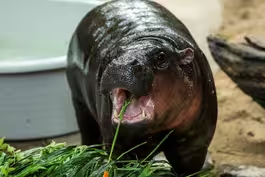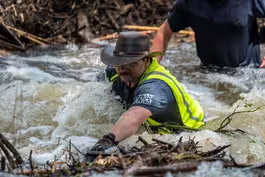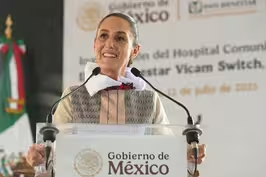
Search for justice continues for Argentina’s disappeared
Clip: 7/12/2025 | 7m 50sVideo has Closed Captions
Search for justice continues for Argentina’s disappeared, nearly 50 years later
This week, a human rights group in Argentina said a man who disappeared more than 40 years ago under the country’s military dictatorship had been identified and reunited with his sister. But there are concerns that the current government is reversing longstanding policy to continue searching for tens of thousands of citizens who were abducted. Special correspondent Kira Kay reports.
Problems playing video? | Closed Captioning Feedback
Problems playing video? | Closed Captioning Feedback
Major corporate funding for the PBS News Hour is provided by BDO, BNSF, Consumer Cellular, American Cruise Lines, and Raymond James. Funding for the PBS NewsHour Weekend is provided by...

Search for justice continues for Argentina’s disappeared
Clip: 7/12/2025 | 7m 50sVideo has Closed Captions
This week, a human rights group in Argentina said a man who disappeared more than 40 years ago under the country’s military dictatorship had been identified and reunited with his sister. But there are concerns that the current government is reversing longstanding policy to continue searching for tens of thousands of citizens who were abducted. Special correspondent Kira Kay reports.
Problems playing video? | Closed Captioning Feedback
How to Watch PBS News Hour
PBS News Hour is available to stream on pbs.org and the free PBS App, available on iPhone, Apple TV, Android TV, Android smartphones, Amazon Fire TV, Amazon Fire Tablet, Roku, Samsung Smart TV, and Vizio.
Providing Support for PBS.org
Learn Moreabout PBS online sponsorshipJOHN YANG: This week, a human rights group in Argentina said it had identified a man who had been taken from his mother at a secret detention site more than 40 years ago during the country's so called dirty war under the rule of a military dictatorship.
He was reunited with his sister who had searched for him for years.
But there are concerns that the government of Argentine President Javier Milei is reversing long standing policy to continue the search for the tens of thousands of citizens who were abducted, never to be seen again.
The disappeared Special correspondent Kira Kay reports from Buenos Aires.
KIRA KAY (voice-over): Every year Argentina holds a day of remembrance.
The estimated 30,000 people who were murdered or disappeared by the military junta that ran the country from 1976 to 1983.
Americans may know this time as Argentina's dirty war.
When intellectuals, students, unionists and others suspected of being left wing dissidents vanished into detention and torture centers.
Few bodies were ever found.
The method of execution was to drop people into the sea from military planes still alive.
After the junta finally fell, activists pushed the country to account for these crimes.
Carolina Villella represents a victims rights group.
CAROLINA VILLELLA, Legal Team Coordinator, Grandmothers of Plaza de Mayo (through translator): Argentina is known as a global beacon in matters of memory, truth and justice, with more than 1200 people convicted of crimes against humanity.
And it has a long history of human rights organizations and victims driving this entire process.
KIRA KAY (voice-over): To educate new generations about this dark past, memory centers like this one have also been created at former clandestine sites.
Some of these sites remain active crime scenes.
Archaeologist Laura Duguine has been excavating this basement of a former detention center.
Duguine's team occasionally recovers personal artifacts that both serve as evidence of trials and as a last sign of life for families whose loved ones never returned home.
LAURA DUGUINE, Coordinator, Memory Space "Club Atletico" (through translator): Argentine society is still piecing together information about state terrorism because a pact of silence by Argentina's military remains in place to this day.
KIRA KAY (voice-over): The artifacts we found have helped to confirm the testimony of survivors.
The junta also appropriated more than 400 babies taken from their mothers before they were executed and given to other families, often members of Argentina's military.
Leonardo Fasati was one of them.
LEONARDO FOSSATI, Undersecretary for Human Rights, City of La Plata (through translator): I was born in this clandestine detention center on March 12, 1977, where my mother and father were disappeared.
There were many years where I had doubts about my identity.
I didn't bear a physical resemblance to the family that raised me.
And we didn't have any photos from my mother's pregnancy.
KIRA KAY (voice-over): Fossati and 139 other now adults have recovered their previous identities with the help of an organization called the Abuelas, or Grandmothers of the Plaza Dimaggio.
Estela Carlotto, now 94, found her own grandson in 2014.
Two missing grandchildren have been identified so far this year.
WOMAN (through translator): It's not just about identifying these victims and allowing them to live the truth and have the opportunity to meet their families.
It also has to do with ensuring that these crimes, which are the most serious in the world, are punished.
KIRA KAY (voice-over): But activists say all this progress is now at risk through actions by Argentina's new government.
In November 2023, Argentina elected President Javier Milei, a libertarian economist who promised to address the country's economic chaos.
Facundo Robles managed the Wilson Center's Latin America program.
FACUNDO ROBLES, Former Latin American Program Coordinator, Wilson Center: In the period that goes from February 2017 to February 2025, inflation was 7800 percent.
Milei, he's drastically decreasing the size of the state.
He fired 40,000 people out of the public sector.
KIRA KAY (voice-over): Milei is known for his flamboyant style.
Hi, my friend.
And his cost cutting was an inspiration for DOGE.
Earlier this year, he appeared at a Washington D.C. republican conference to hand Elon Musk a chainsaw.
ELON MUSK, CEO of Tesla: A chainsaw for bureaucracy.
KIRA KAY (voice-over): While the government cuts are mostly across the board, Carolina Villella says the ongoing search for children abducted by the junta is under additional pressure.
CAROLINA VILLELLA (through translator): The Special Investigations Unit within the National Commission for the Right to Identity was closed.
The National Genetic Data bank is being cut, a budget reduction of almost 50 percent.
The Ministry of Security's documents are extremely important for conducting investigations.
But the document analysis team has been dismantled.
KIRA KAY (voice-over): Memory sites are facing drastic cuts too, and must shorten their operating hours and end programming.
And at archaeologist Laura Duguine's lab, signs mark the chairs of her laid off staffers.
She has had to stop expanding work at her site when a new roof to protect it was cancelled by the Ministry of Public Works.
LAURA DUGUINE (through translator): If we can't conserve the archaeological site today, tomorrow we won't have it.
And the heritage can't be replaced.
While the trials are today, they won't be in 20 years.
KIRA KAY (voice-over): At an Inter-American Commission hearing in Washington D.C. the government defended its cuts, insisting memory programs will continue despite them.
But Milei's administration has also gone on the attack.
His vice president is the niece of an officer charged with a disappearance.
Both Xi and Milei have questioned the number of 30,000 junta victims.
And over the last two Remembrance Day holidays, the government's official video accused victims groups of manipulating memory for political and economic gain.
FACUNDO ROBLES: Milei had the support of a generation of people that don't know and maybe they don't even care of what the dictatorship was.
And as long as Milei controls inflation, people will be like, say whatever you want.
KIRA KAY (voaice-over): Leonardo Fossati says remaining survivors deserve to have their cases solved.
LEONARDO FOSSATI (through translator): It was a gift of life to regain my identity.
And it's only fair that other people who are going through the same thing know the truth.
We urge the world's societies to call on Argentina to respect human rights.
KIRA KAY (voice-over): For PBS News Weekend, I'm Kira Kay in Buenos Aires, Argentina.
Moo Deng, baby hippo who took social media by storm, turns 1
Video has Closed Captions
Clip: 7/12/2025 | 2m 45s | Moo Deng, the baby hippo who took social media by storm, turns 1 (2m 45s)
New analysis reveals FEMA missed major flood risks in Texas
Video has Closed Captions
Clip: 7/12/2025 | 5m 18s | FEMA missed major flood risks at Camp Mystic in Texas, new analysis reveals (5m 18s)
News Wrap: Trump announces 30% tariffs on Mexico and EU
Video has Closed Captions
Clip: 7/12/2025 | 2m 17s | News Wrap: Trump announces 30% tariffs on goods from Mexico and EU (2m 17s)
NIH funding cuts threaten research on sickle cell disease
Video has Closed Captions
Clip: 7/12/2025 | 5m 23s | Trump administration’s NIH funding cuts threaten research on sickle cell disease (5m 23s)
Providing Support for PBS.org
Learn Moreabout PBS online sponsorshipSupport for PBS provided by:
Major corporate funding for the PBS News Hour is provided by BDO, BNSF, Consumer Cellular, American Cruise Lines, and Raymond James. Funding for the PBS NewsHour Weekend is provided by...















